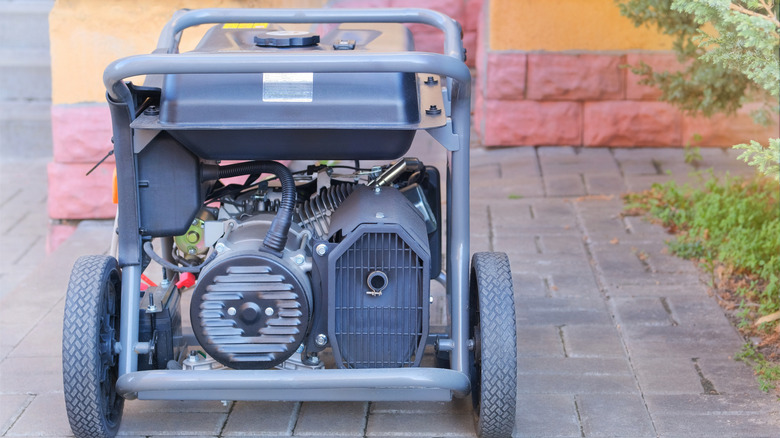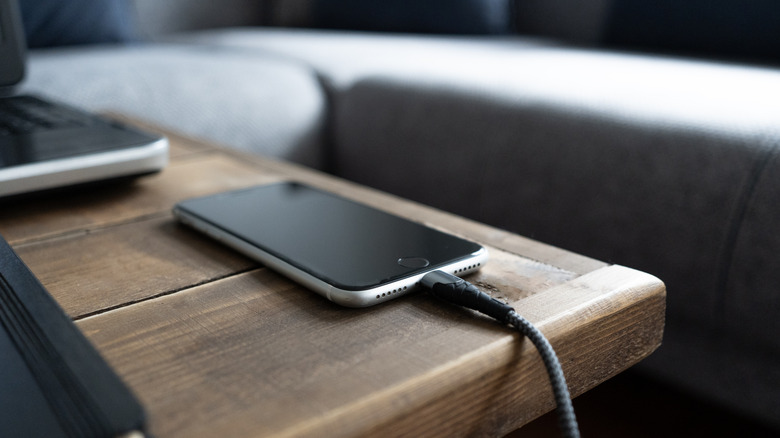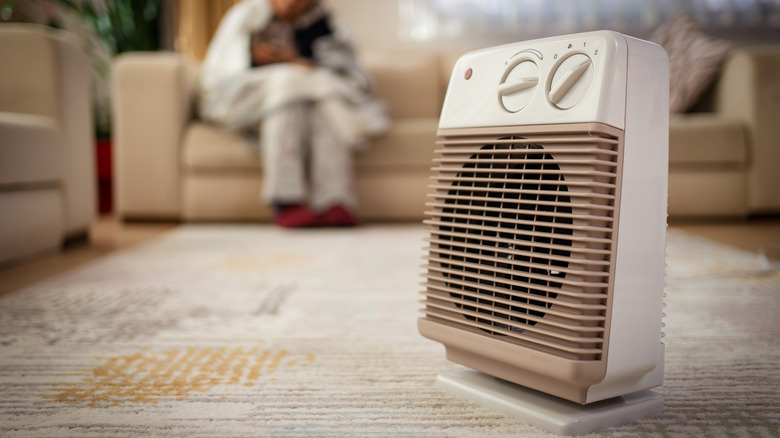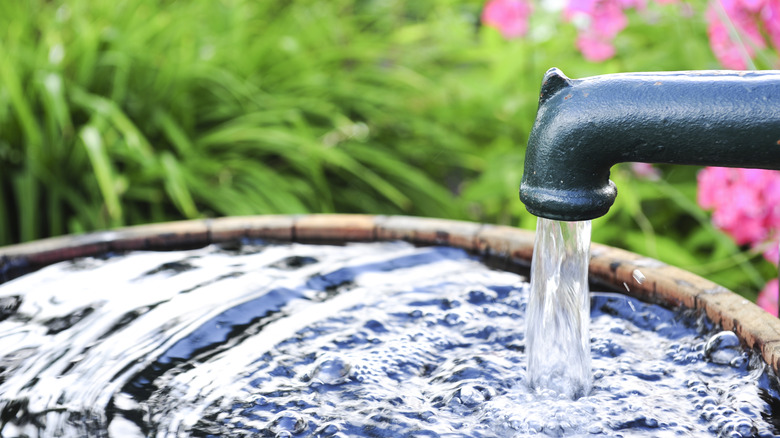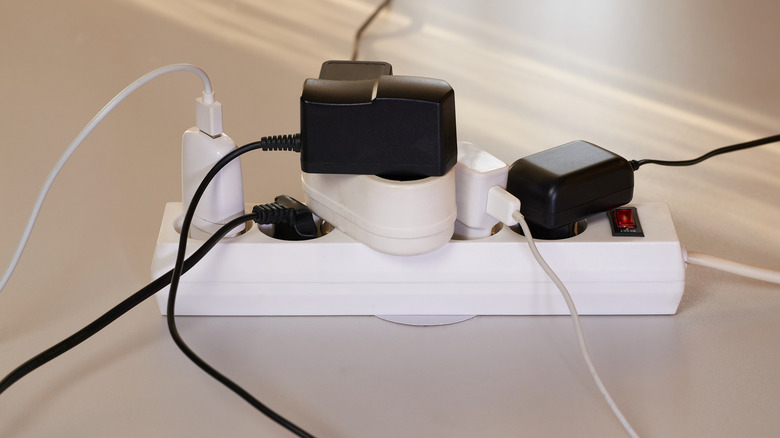5 Things You Should Never Plug Into A Generator
When the power goes out, having a generator feels like hitting the jackpot. While all the neighbors around you are sitting in darkness pretending like it's the 1800s, you have a way to keep certain areas of your home life thriving. They're not perfect solutions, but they can be enough to help you make a hot meal and ensure you don't have to brush your teeth in pitch black. However, they do have some limits, and knowing what you should never plug into a generator can help you stay safe.
Your first thought might be to power up your freezer, so your food stash doesn't spoil. You might be tempted to charge your tablets and phones, so your kiddos don't get bored. And if you think the power might be off for a while, you might even attempt to wash clothes, cook full-course dinners, and watch TV, if you have enough power ports. But don't be this person. The most important thing to remember is that a generator is just for worst-case scenarios. They're made to cover your essentials when the grid goes down, not to power all the comforts you're used to. Use this guide to learn what you should never plug into a generator, or at least take extra caution.
Electronics with a circuit board
Portable generators aren't always friendly with electronics. Anything with a circuit board, like smartphones, tablets, televisions, and gaming consoles, needs clean, stable electricity. Generators can't always deliver this. Power can surge and dip as the motor changes speed, and those energy swings hit sensitive electronics.
This is what we call "dirty power." It's when power isn't smooth or steady, and can change without warning. These tiny shifts don't bother things like lights or fans, but they can wreak havoc on anything with a circuit board. These shifts can scorch electronic components and may shorten your device's lifespan, if it doesn't kill it altogether. If you need to charge electronics like phones or laptops during an outage, don't plug them directly into your generator. Use an inverter generator, a quality surge protector, or an uninterrupted power supply (UPS) that can smooth out the power before it reaches your device.
Major appliances with a high wattage
Firing up a generator during an outage can feel like hitting a giant "reset" button, but that doesn't mean everything is business as usual. One rule of thumb is to keep your major appliances off the generator. Things like ovens, washing machines, dryers, and refrigerators demand far more power than many portable units can safely deliver. Appliances start pulling huge wattage the moment they kick on, and this can lead to a power surge that strains your generator. Strains can cause your generator to work harder than it should, and it may overload as a result. This is even more of a risk when you're powering multiple large appliances from the same generator.
When you overload a generator, the voltage drops or the generator shuts down altogether. Either way, you might fry sensitive electronics in your appliance or the generator itself. You may end up damaging both in the process, and it's just not worth the risk. Before using any major appliance with your generator, understand your generator's capacity and what the manufacturer recommends. Some generators may be suited to handle a single large appliance, but never assume that yours is one of them.
Anything with a heating element
During a power outage, your first priority is likely your own comfort. If it's cold outside, this means keeping your home warm. But think twice before plugging in anything with a heating element (think space heaters, heating pads, etc.). These devices draw large amounts of power initially so that they can heat up quickly. While this is a good thing when you need heat in a pinch, it can also be bad news for your generator. This rapid energy pull can overwhelm your generator and cause it to shut down.
Even worse, heating elements run hot and need consistent, stable power to stay safe. If you're operating a space heater, you'll need to monitor it closely and constantly to ensure it doesn't overheat. Surges and dips in power can cause things like space heaters to overheat, shut down, or even create a fire risk. The last thing you want is for fluctuating power to feed something that's already designed to be scorching hot. Still, no one wants to be uncomfortable during a power outage, so your best bet is to read your generator manufacturer's recommendations about using devices that produce heat. Never leave them unattended, and be ready to act if it seems like your device starts to overheat.
Well pumps
Like major appliances, a well water pump will start drawing massive power the moment it's plugged in and turned on. It needs this initial boost to start pushing water. This rapid start can overwhelm a generator, forcing it to bog down, stall, or shut down. And once the pump is running, it needs stable, reliable power to maintain consistent pressure. Generators don't always provide this, and any fluctuation in voltage can cause the pump to shut off mid-cycle or overheat. You don't want to have to pay to replace an expensive well pump, plus you'll be without water long after your power outage ends.
If you think you'll need to run a well pump during a power outage, make sure you're buying a generator that is the right size for the job. Never assume your generator is up for the task. And if you do select a generator that can run a well pump, it might be best to only use it for this purpose and avoid plugging additional items into the same generator.
Cheap extension cords or power strips
A bargain bin power strip or extension cord might look like a great score, especially since there's always a need for extras. But they need to stay far, far away from your portable generator. They're not built for the kind of load that generators produce. These cords are cheap for a reason: They usually have thin wiring, loose connections, and/or low-quality insulation. That means they're weak links that can melt, spark, or fail when you need them the most. Flimsy cords can't handle the constant stress of power fluctuations. This is one way fires start, not from the actual generator but from the things you plug into it.
There are safe ways to use power strips and extension cords with your generator. For instance, if your generator is stationed outside, you'll need to use only extension cords that are rated for outdoor use. Choose high-quality surge protectors that match the wattage you're pulling. If the cord is a Dollar Tree find or if it looks thin, flimsy, or suspiciously inexpensive, put it to use somewhere else. Reliable cords will keep your generator (and your home) safe.
